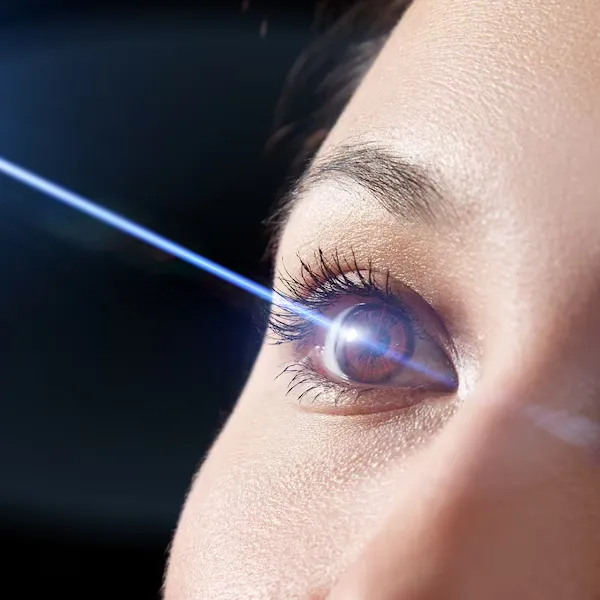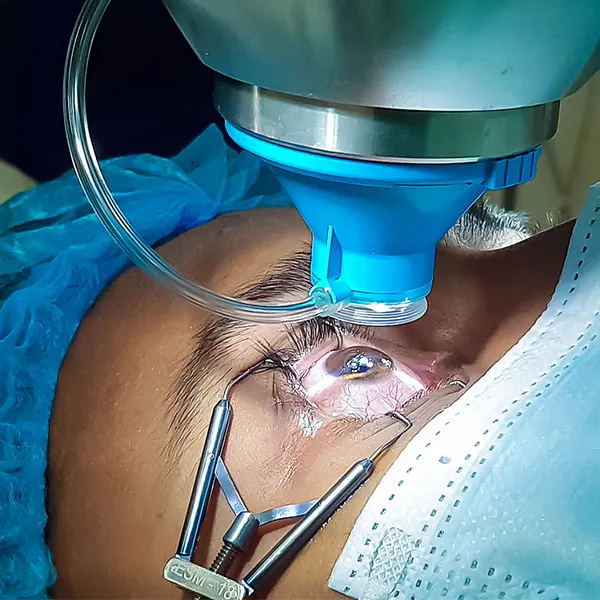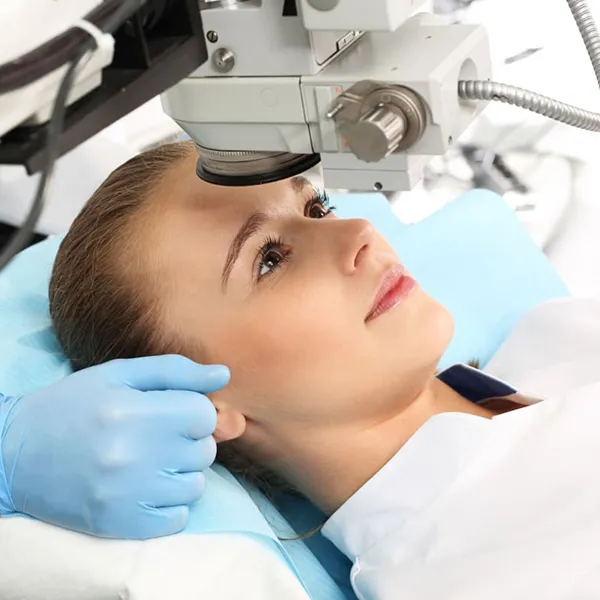
LASIK Laser Eye Surgery at DRISHTI EYE HOSPITAL
Our experienced team of refractive surgeons possesses the expertise, making Drishti Eye Hospital the trusted choice for those seeking freedom from glasses or contact lenses. With a meticulous focus on long-term safety and patient satisfaction, we offer customers the best laser eye surgery.
Call to ask any question +91-708-7219008

Dr. Ashok Gupta
(Chairman and founder)LASIK Laser Eye Surgery
LASIK is a minimally invasive refractive surgery used to treat common vision issues like myopia (nearsightedness), hyperopia (farsightedness), and astigmatism. This procedure involves precise laser reshaping of the cornea, allowing light to focus directly onto the retina, thus eliminating the need for corrective spectacles. Patients typically experience rapid visual recovery, minimal discomfort, and significantly improved quality of life.

Who’s a Good Fit for LASIK?
Diverse Laser Refractive Techniques
In addition to LASIK, our professionals specialize in a variety of laser refractive methods adapted to individual needs, such as Photorefractive Keratectomy. These procedures are alternatives to regular LASIK and are appropriate for a broader spectrum of patients who have a thin cornea, which is unfit for LASIK. We show our commitment to innovation by investing in the latest laser technology, ensuring that every refractive eye surgery we perform is precise and safe at the highest level.

Expertise and trust at DRISHTI EYE HOSPITAL
Our experienced team of refractive surgeons possesses a wealth of expertise, making Drishti Eye Hospital the trusted choice for those seeking freedom from glasses or contact lenses. With a meticulous focus on long-term safety and patient satisfaction, we offer customers the best laser eye surgery. We are proud of our high rejection rate for Lasik in the long-term safety of patient eyes.
An alternative to LASIK, particularly suitable for patients with thinner corneas, PRK involves the removal of the cornea’s outer layer before reshaping the underlying tissue with a laser.
It is a procedure that uses advanced corneal topography to identify irregularities in the cornea, enabling highly accurate corrections to be made.
These lenses are implanted in front of the natural lens to correct high refractive errors, such as extreme myopia or hyperopia, providing clear vision without removing the eye’s natural lens.
Each of these eye surgeries for vision correction provides distinct advantages and is chosen based on factors such as corneal thickness, anterior chamber depth, prescription, and patient preferences. Our skilled ophthalmologists collaborate closely with patients to identify the most appropriate procedure, aiming for optimal visual results and an enhanced quality of life.
Benefits of LASIK Surgery Or Laser Eye Treatment
Better Quality of Life
Short Procedure
Minimal Discomfort
High Success Rate
Reduced Dependency
Long-Lasting Results
The Best LASIK Surgery in Chandigarh
When it comes to LASIK, our team at Drishti Eye Hospital is the best. We’ve got top-notch experts who are dedicated to giving you the best care possible. Plus, we use the latest technology to make sure your procedure is safe and effective, so you can toss those glasses or contacts with confidence.
Moreover, we are offering you affordable prices for Lasik in Chandigarh as we believe that a clear vision should be affordable for everyone. Your vision matters to us, and we’re here to make sure you get the best care without breaking the bank.
FAQs
The cost of laser eye surgery can vary based on factors such as the type of procedure, technology used, surgeon's expertise, and geographic location. While it may represent a significant investment, many clinics offer financing options to make it more accessible for patients.
LASIK surgery typically lasts around 10 to 12 minutes per eye.
Many patients experience improved vision immediately following LASIK surgery. While some may have temporary fluctuations, optimal vision is typically achieved within a week or two.
Certainly, akin to any surgical procedure, LASIK surgery carries potential side effects or complications. These might encompass dry eyes, glare, halos, light sensitivity, and challenges with night driving. While serious complications are rare, they could include infection, issues with the corneal flap, or under corrections.
Some people might not be good candidates for laser eye surgery (LASIK). This encompasses those with unstable vision, thin or irregular corneas, specific eye diseases or conditions, autoimmune disorders, or pregnant individuals.
The eyes typically require several days to a few weeks to fully recover following laser eye surgery. While most patients experience improved vision within the first few days, complete recovery may take a few weeks depending on the type of laser surgery.
While LASIK can be performed on individuals of various ages, the majority of ideal candidates are typically between 18-40 years old. However, older individuals may still undergo LASIK surgery if they meet specific criteria.
During laser eye treatment, your surgeon will utilize an instrument called an eyelid speculum to gently hold your eyelids open, ensuring that your eyes remain stable and exposed throughout the procedure.
Laser eye surgery, such as LASIK, is typically not used to address cataracts. Instead, cataract surgery involves removing the cloudy lens and replacing it with an artificial lens, which can provide clear vision similar to laser vision correction.
LASIK is widely regarded as safe, with minimal risk of complications. It has undergone extensive research and development, with millions of successful surgeries worldwide.
LASIK technology includes measures to minimize the impact of blinking or involuntary eye movements. Advanced eye-tracking systems ensure precise laser delivery, even if minor movements occur.
Most patients can resume driving within one to two days after LASIK surgery, provided their vision meets legal requirements and they feel comfortable behind the wheel. However, adherence to post-operative care instructions and any driving restrictions advised by the surgeon is crucial.
While laser eye treatment can offer enduring vision correction, it doesn't guarantee a lifetime of perfect vision. Over time, some individuals may encounter a regression of vision, necessitating additional procedures or continued use of glasses or contacts.
Before undergoing laser eye treatment, you should expect to undergo a thorough eye examination to evaluate your suitability for the procedure. Your surgeon will provide a detailed discussion of the procedure, including potential risks and benefits, and offer instructions for pre-operative preparation.
Blurry vision following laser eye treatment may occur during the initial healing process as the cornea adjusts to its new shape. Dry eyes and inflammation can also contribute to temporary blurriness.
Immediately after laser eye surgery, some individuals may experience minor discomfort, such as dryness, irritation, or a gritty sensation in the eyes. However, many patients report improved vision almost immediately following the procedure.
For most patients, laser eye surgery involves minimal discomfort or pain during the procedure, thanks to the use of numbing eye drops. While some individuals may experience minor pressure or discomfort, it is generally well-tolerated.
Yes, laser eye treatment can effectively correct blurred vision caused by refractive errors like nearsightedness, farsightedness, and astigmatism, offering clearer vision without the need for glasses or contact lenses.


